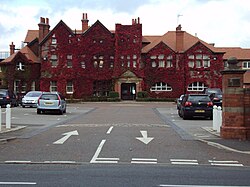Royal Liverpool Golf Club, Hoylake
 
The clubhouse at Royal Liverpool Golf Club
|
|
| Club information | |
|---|---|
| Coordinates | 53°23′06″N 3°11′24″W / 53.385°N 3.190°WCoordinates: 53°23′06″N 3°11′24″W / 53.385°N 3.190°W |
| Location | Wirral, England |
| Established | 1869, 148 years ago |
| Type | private |
| Total holes | 18 |
| Tournaments hosted |
Open Championship Amateur Championship Women's British Open |
| Website | royal-liverpool-golf.com |
| Designed by | Robert Chambers, George Morris, Harry Colt |
| Par | 72 |
| Length | 7,218 yards (6,600 m) |
The Royal Liverpool Golf Club is a golf club in Wirral in England. It was founded in 1869 on what was then the racecourse of the Liverpool Hunt Club and received the "Royal" designation in 1871 due to the patronage of the Duke of Connaught of the day, one of Queen Victoria's younger sons. Robert Chambers and George Morris (younger brother of Old Tom Morris) were commissioned to lay out the original course, which was extended to 18 holes in 1871. Harry Colt, one of the world's leading golf course architects, redesigned the course early in the 20th century, and it has since been tweaked periodically, mainly as a response to advances in equipment.
Royal Liverpool Golf Club is located in the small town of Hoylake, at the northwest corner of the Wirral Peninsula. The golf course extends between Hoylake and the neighbouring town of West Kirby, to the southwest. It has a single 18-hole course, which is a seaside links.
The Open Championship was held at Royal Liverpool in 2006 for the first time since 1967. The course's routing was changed slightly for the championship, with play starting on the club's 17th hole and concluding at the par-5 16th hole.
Royal Liverpool has a long and distinguished history of golfing firsts. It was originator and host to the inaugural men’s amateur championship in 1885, which became The Amateur Championship. It was host to the first ever international match between Scotland and England in 1902. It hosted the first Home International matches, and the first transatlantic contest between Great Britain & Ireland and the United States in 1921, an event which became the Walker Cup the following year. In fact, it is Royal Liverpool Golf Club's contribution to the amateur game that has set it apart from all other clubs in England. Although, at the end of the nineteenth century, it was the Royal and Ancient Golf Club of St Andrews that took on the role of the governing body in golf as the game developed, it was at Royal Liverpool that the rules of amateur status were laid down. The Open at Royal Liverpool was also the scene of the second leg of Bobby Jones' historic Grand Slam in 1930.
...
Wikipedia
